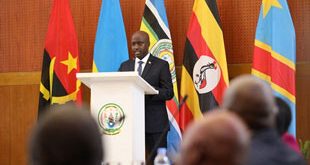
Cairo, Egypt | Xinhua | The World Health Organization (WHO)’s approval to grant six African countries the technology to manufacture mRNA (messenger ribonucleic acid) vaccines would boost international efforts to confront the COVID-19 pandemic, Egyptian experts and officials said.
On Friday, WHO announced that Egypt, Kenya, Nigeria, Senegal, South Africa and Tunisia will be part of a project that aims to enable low-and middle-income countries to manufacture mRNA vaccines in line with international standards. The project also intends to reduce Africa’s reliance on vaccine manufacturers outside the continent.
Dr. Naeema Al Gasseer, WHO’s representative in Egypt, stressed the significance of the decision, saying that the transfer of vaccine manufacturing technology would boost international efforts to confront the pandemic.
“Africa has received vaccines less than any other continent,” al- Al Gasseer told Xinhua, affirming that the WHO approval is meant to achieve health security for the international community.
She noted that the countries that have been granted the right to manufacture the vaccine already possess the required personnel competence, technological capabilities, and large financial investments, as well as the great political will to make this procedure a success.
“There is an opportunity to strengthen partnerships to transfer vaccine manufacturing technology, whether between the developed countries and the six countries, or among the six countries themselves,” she said, stressing that the WHO will play a fundamental role in supporting the pharmaceutical industries in Africa and the economic growth in these countries.
The UN official praised China’s cooperation since the beginning of the pandemic with various countries, especially the developing ones, and its initiative to cooperate with Egypt and a number of other developing countries in the production of coronavirus vaccines.
For his part, Dr. Islam Anan, an Egyptian professor of health economics, epidemiology and virology, said that the WHO’s decision is an “important step” that will contribute significantly to containing the pandemic.
Anan added that the two continents most affected by the lack of vaccines are Africa and South America, stressing that Africa is the main gateway to prevent virus mutations.
In this regard, he valued the WHO plans to assist African countries through transferring medical technology to manufacture vaccines locally, instead of “begging rich or vaccine-manufacturing countries to support poor ones.”
He pointed out that the transfer of drug and vaccine technology generally takes two years, “but during the pandemic, it may take only six months.”
Meanwhile, Dr. Ahmed Shahin, professor of virology at Zagazig University in Egypt, confirmed that granting these African countries the technology for the manufacture of mRNA vaccines will play a prominent role in the localization of vaccine and drug manufacturing technology in Africa, and help the international community control the pandemic.
“The WHO’s decision offers Egypt and other concerned African countries the opportunity to overcome the dilemma of intellectual property rights, and gives them the right to use the technology needed to manufacture vaccines against the COVID-19 pandemic,” Shahin told Xinhua.
He added that Egypt had made a notable leap in the production of the COVID-19 vaccines, through cooperation with China’s Sinovac company, noting that the new move would make Egypt a regional hub for vaccine production.
The Egyptian state-owned vaccine maker VACSERA and Chinese biopharmaceutical company Sinovac signed two agreements in April 2021 to jointly manufacture Sinovac vaccines in VACSERA’s factory in the North African country.
According to the Egyptian health ministry, Egypt has produced more than 30 million doses of the Sinovac vaccine.
*****
URN
 The Independent Uganda: You get the Truth we Pay the Price
The Independent Uganda: You get the Truth we Pay the Price



